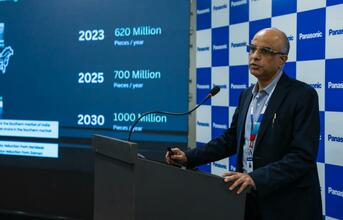
Panasonic Electric Works India (PEWIN), a subset of Panasonic Life Solutions India Limited, has announced its plans to scale up production and expand its technological manufacturing base in the coming years.
Rajesh Nandwani, Director of Power Business, PEWIN, stated, "We currently manufacture 650 million pieces annually, and our goal is to elevate this to 1,000 million by the year 2030."
Investments for Growth
Over the span of five years (2021 - 2025), PEWIN aims to make an investment of Rs 600 crore to drive its growth initiatives. Notably, Rs 300 crore of this investment has been channelled into the establishment of its facility in Andhra Pradesh. This move marks the company's expansion into the southern region of India, specifically in Sri City, Andhra Pradesh. The geographical shift aims to bring PEWIN closer to its customers, resulting in a significant reduction of 5-6 days in delivery time compared to their Haridwar and Daman Plants.
Technological Advancements in Operations
The facility at Andhra Pradesh includes an Automated Guided Vehicle (AGV) system that eliminates the need for manual transportation of goods. Additionally, the facility is equipped with synchronised lifts to optimize efficiency.
Half of PEWIN's products are fully assembled by automated machines, minimising human intervention, and redirecting human potential toward more value-added tasks. As of 2022, the company has provided employment to over 600 individuals.
To further its research and development efforts, PEWIN has also established an advanced R&D laboratory at its Daman factory, with an investment of Rs 8 crore. This facility is dedicated to conducting performance and reliability tests, which will help the company focus on quality in addition to its increase in terms of quantity.
Further, Nandwani revealed to The Machinist, "We also want to make sure that a significant source of electricity for our factories comes from solar. Our Daman and Haridwar plants are already powered by solar energy, and we are in the process of expanding this eco-friendly approach to our Sri City facility."
With changes in manufacturing at hand, the company aims to triple its current business of Rs 5,000 crore (as of FY22) by 2030.



























